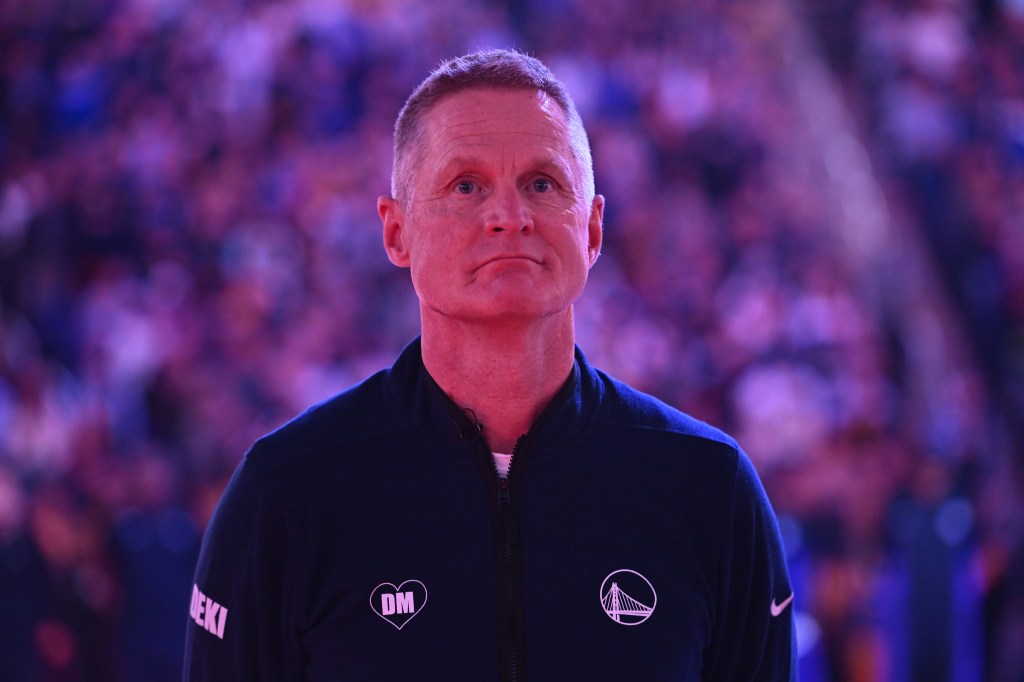
LAIE, Hawaii — Steph Curry and Draymond Green are used to playing for championships. They, along with Klay Thompson, head coach Steve Kerr and several other dynastic core main characters have established the Warriors as a championship franchise. The expectation at 1 Warriors Way is winning, and winning at the highest level — from the ownership level down.
Yet the Warriors are coming off a playoff-less, 46-win season. Thompson departed for Dallas. Curry and Green are in their mid-30s. The Western Conference is as deep as ever. Betting markets have Golden State at roughly even odds to make the postseason.
Even just Thompson’s absence signals a different chapter in the Warriors’ dynasty — perhaps a post-dynasty era. Reality is setting in that a championship may not be realistic anymore for the team as currently constructed.
When asked if it’s difficult to convince a player like Green, who has won four titles and been to two more NBA Finals, to stick with the franchise as it gets further away from its dominant past, Kerr said he doesn’t have to talk Green into doing anything. Green’s a bonafide competitor no matter what.
“Obviously, Steph, Draymond, if we could have gotten another superstar player to come in, they would’ve loved that,” Kerr said. “But we didn’t. We tried, but we didn’t. We’ve got some really good vets who have come in from the summer movement. And we’ve got guys who are scrappy. I see Draymond and Steph really enjoying this team.”
In his answer, though, Kerr’s mind drifted to a related topic: The external expectations of championship-or-bust. In NBA circles, it’s known as “Ringz Culture,” and Kerr disagrees with its basic premise.
“To modern sports fandom, everything is, ‘Win the championship or nothing else matters,’” Kerr said. “But it’s really not true. What matters is do you have a good team? Do you have a team that your fans love watching? Do you have a team that, ‘Hey, we’ve got a shot.’ Let’s be scrappy, let’s be tough as hell. Let’s have a team that brings a lot of juice, a lot of energy, a lot of joy. This is not a zero-sum game.”
As someone who has won nine NBA championships in his career — four as a coach and five as a player — Kerr’s perspective is particularly relevant. And it hints at how he views this particular roster.
The Ringz Culture trend has been amplified by the rise of social media and around-the-clock television punditry. The omnipresent “GOAT” debate between Michael Jordan and LeBron James centers around championships; Jordan was a perfect 6-for-6 in the Finals, while James has won four titles in 10 trips.
The concept has manifested itself in tangible ways, though. Players, particularly those who are late in their careers and haven’t yet won a championship, often latch on to a contending team when they can. Ring-chasing isn’t just limited to the NBA, either.
That’s why some armchair psychologists could theorize that Curry or Green might want to leave Golden State if the team’s title hopes dissolve. Even Curry himself said he doesn’t want to spend the end of his career playing for a “bottom-feeder” before he committed to the Warriors with a one-year extension.
“Everybody wants to make it, ‘Well, do Steph and Draymond want to get out of here because the Warriors are no longer a championship (team)?’” Kerr said. “I just think it can’t possibly work that way. Otherwise, like 24 teams should just not show up at the beginning of every year. But that’s kind of the tone everyone wants to set — if you don’t win a championship, you’re a failure. It’s not real life.”
What’s real for the Warriors this year, Kerr said, is the possibility of having “a hell of a year and be a really scrappy, tough defensive-minded team.” The Warriors made offseason additions to do that, even if they couldn’t swing trades for Paul George or Lauri Markkanen.
And sports are unpredictable. Hardly anyone considered the Warriors heading into the 2021-22 season to be championship contenders, but they made an unlikely run to their fourth title.
It’s possible players, and teams, can be insulated from the perils of Ringz Culture when they’ve already won at the highest level, like Curry and Green. They might value other things, like staying with one franchise for their entire career or off-court lifestyle, in addition to pursuing the Larry O’Brien Trophy.
Kerr’s view is that every player, and team, needs to figure out their circumstances and adapt from there. But that doesn’t change the all-or-nothing culture.
“I think every team in the league now is under incredible external pressure to win a championship or they’re a failure,” Kerr said.
“Because that’s the easy narrative and that’s the American sports culture right now. It’s going to be really interesting, because a lot of teams have put all their chips in the middle. Let’s see where everybody is 10 years from now – we might swing completely back in the other direction. There might be a handful of teams that go, ‘Man, look what we did. We have no picks.’ And they’re stuck for years. So we’ve got to see where all this shakes out. For us, we’re just trying to continue what has been an amazing run. We’ve won four titles, we want to win another one. The best way we know how is to do what we’re doing right now: Make the personnel moves we’ve made, coach these guys up, bring the juice, bring the joy to the game, let’s see how good we can get. Then you go from there.”

















































